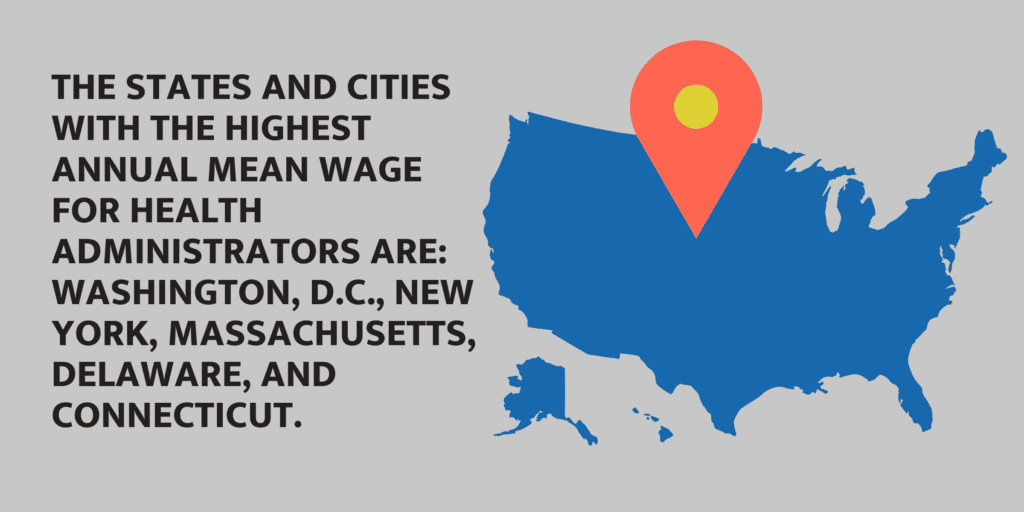Health care is an interdisciplinary process. Patients must be found, provided with adequate intake procedures, treated through an interdisciplinary team, properly educated, properly billed, and ongoing patient relationships must be nurtured. While each individual team member within a patient medical experience may perform well, there’s no guarantee that all of the complex components of the health care system will work well together. That’s where health care administration comes into play.
Medical settings are some of the largest employers in nearly every town in America. A level of sophistication within medical management and decision making is required for the system to run smoothly. Qualified health care administrators are the answer to these issues. If you think you may be interested in a degree in health care administration, and are wondering what you can do with it, check out our original research below!
Skip To
- What is a Health Administrator? What is a Health Administration Degree or Certification?
- What are the Available Health Administration Degrees?
- Ask Yourself and Consider the Following About Your Health Administration Education and Career
- How Can We Help You In Your Health Care Education and Career?
- What Can You Expect to Earn as a Health Administrator? What’s Health Administrator Employment Like?
What is a Health Administrator? What is a Health Administration Degree? What Do Health Administrators Do?
The health care system in America is a rapidly expanding labyrinth made up of thousands of insurance plans, shifting government regulations, new research, methods, technologies, and facilities. Other essential factors impacting health care include an aging Boomer population and the lack of supply of qualified health professionals, coupled with a growing demand for them. These health care trends demand an ever-increasing need for management and administration.

Working in health is an excellent way to help others while working in diverse, challenging environments. Getting a job in health can give you incredible opportunities and excellent job security. In this guide, we’ll explore the education, duties, and employment of health administrators.
Health Care Administrators are credentialed medical professionals and leaders within the field. They might be in charge of departments in medical facilities, like the pediatric or geriatric department, the residents at a hospital, or entire facilities themselves, like nursing homes or hospitals.
People in these roles will likely have diverse skill sets. They may hold multiple degrees and have worked in positions that are more technical than supervisory. There are many routes to becoming a Health Care Administrator. As a general rule, you’ll need to earn degrees and have an applicable work history in a sector of health care and health management that applies to your career goals.
Working as a health administrator can be very lucrative work. There are hundreds of thousands of these roles across the country, and the field is expected to add tens of thousands of jobs in the coming years.
Some of the degrees you might end up in fall under umbrellas of health management, public health administration, or business degrees in health care administration (more on this later). While you won’t need to work as a doctor or nurse, you’ll likely need to earn a degree or certification that lets you work in an area of health, then earn further degrees that build upon your experience in the first jobs you do in the field. Although it’s not required, it’s very common for people to have a Master’s degree in these roles.
Health Care Administrators are highly organized, extremely motivated, and versatile leaders. To be successful, you’ll need to have a wide range of competencies. Some of these include:
- Communication Skills: Health Administrators coordinate staff, deal with clients, and liaise with supervisors. They handle communication and collaboration with bureaucracies outside of their organization that their patients and clients depend on.
- Technical Aptitudes: In these roles, you’ll need to have some skills and understanding of medical processes, even if you don’t do them directly.
- Incredible Organization: Health Administrators are often responsible for many moving parts, including operations, staff, client satisfaction, meeting organizational standards, among others.
- Commitment to Learning and Building New Skills: Health Administrators are constantly evolving in their careers. This includes gaining new certifications, degrees, attending lectures and conferences, taking on new responsibilities, and more. You’ll need to be dedicated to expanding your skills and competencies, not just resting on your laurels.

Remember, the duties of a health administrator can be very different depending on their specialization and the organization they work for. However, some of the everyday responsibilities of health administrators include:
- Guaranteeing clients and patients receive appropriate services and treatment, and their satisfaction.
- Overseeing services like surgery, nursing, therapy, recovery, and any other services the organization you work for provides.
- Designing and enacting unique programs that serve and enhance staff and client/patient experiences and outcomes.
- Writing, enacting, and maintaining policies that encourage quality of service and order.
- Overseeing the maintenance of facilities.
- Handling budgeting and resource allocation.
- Collaborating with affiliated, aligned, or auxiliary groups that your organization depends on.
Let’s explore the different levels of these degrees, and specializations within the field:
What are the Available Health Administration Degrees?
Associates in Health Administration
These two-year degrees tackle the foundational aspects of health administration. You’ll learn about topics that include medical law, ethics, terminology, and much more. Students might specialize in areas like medical records, pharmacy practices, coding, and billing, among other subareas of the field. Graduates will be ready to work in preliminary positions in the field. You can qualify to work as a record technician, medical secretary, transcriptionist, administrative assistant, in facilities like hospitals, clinics, doctor’s offices, nursing homes, and more. Classes will likely cover management principles, diseases, preparation of insurance claims, information technology, health language, and much more. You can also apply your credits towards a higher degree, like a:
Bachelors in Health Administration
These degrees take four years to earn. They’ll likely involve internships, work studies, and capstone requirements. There may be online offerings for these programs, but they’ll probably require some in-person participation. Classes will cover business practices, the coordination of employees, technology, resources, and workers effectively to meet organizational standards and provide optimal health outcomes. Graduates will be prepared to supervise resources, finances, services, and operations in nursing homes, clinics, hospitals, and other medical institutions. You might delve further into areas like health regulations, marketing, accounting, personnel management, healthcare law, economics, medical records, among other areas of health administration.
Masters in Health Administration

These programs generally take two years to earn. In them, students will prepare for work as health policymakers, analysts, managers, consultants, among other roles. They might specialize in areas like information technology, policy, finance, quality control, and more. You’ll likely be able to work while you attend one of these programs, and some may have residencies or other practicum opportunities for students. Courses will likely include health information systems, health care economics, patient care, quality control, ethics and laws, medical facility management, and much more. You’ll likely find some online offerings for these degrees, but will probably need to do in-person work to complete them.
Doctorates in Health Administration
To earn a doctorate in health administration, you’ll need to commit at least five years of study, research, and labor. To qualify for these programs, you’ll likely need a graduate degree, and applicants with a Master’s in health will be given preference. Most graduates of these programs work in academic settings. You’ll focus on areas of your choosing that apply to your career and educational experience. These might include health care economics, health policies, research methods, health laws and ethics, current issues in the health landscape, among many others. These programs culminate in a dissertation of original research and its defense, or another significant culminating project, depending on the program.
Now let’s look at some specializations within health care administration degrees:
Public Health
In public health degrees, you’ll learn how to improve health and promote best practices on an individual and societal scale. It might include disease and injury prevention, controlling infectious diseases, and much more. Courses will likely include epidemiology, the U.S. health care system, public health management, health disparities, biostatistics, and much more.
Health Care Informatics
In these degree specializations, you’ll focus on the information systems that facilitate health care facilities. You’ll study electronic patient records, strategic planning, health care systems, security and privacy, ethics in information management, and much more. You’ll often go on to work outside of standard health environments. You might work in residential care, public health, insurance, research, among other areas and positions.
Health Care Law and Policy

Legislations and regulations that govern health care are always in flux. To wade through the weeds, organizations need qualified administrators with a strong base of knowledge, that can understand and navigate whenever they don’t, or when new legislation/regulations are created. You’ll study health systems, health policy, applied health care law, ethics, public health, policy analysis, and much more.
Health Care Financial Management
The private health care system in America creates a high demand for financial managers at health care organizations. In these specializations, you’ll study accounting, economics, venture development, risk analysis, and much more. You’ll learn how to maintain organizational solvency by any means, while also doing your best to create optimal patient outcomes.
Let’s look at the process of making tough decisions about health care administration degrees and careers:
Ask Yourself and Consider the Following About Your Health Administration Education and Career
- What is your current health administration education and work experience? How has it prepared you to work in health administration?
- Depending on your credentials, it’ll be easier to narrow down where to begin applying for degrees and jobs.
- Health Administration careers are an area where experience and licenses carry a lot of weight. However, many health administrators hold Bachelor’s, or Master’s degrees. Master’s degrees are especially prevalent at larger health care institutions.
- If you want to reach the upper levels of pay and responsibilities, you might consider an advanced health administration degree.
- What are your short and longterm career goals? How will a specific health administration degree program help you reach them?
- Health Administration is a huge field. By picking a lane within it, you can better tailor your education and work experience to a role that you’ll be successful in short and longterm.
- How much can you pay for a health administration degree? How much would you have to borrow to pay for one?
- Whenever possible, avoid private, high-interest loans. Always take public loans. Depending on where you work, you can qualify for loan forgiveness as a health administrator.
- Will you need to work full or part-time while you attend a health administration program?
- Different programs offer different learning schedules to accommodate your current work and life responsibilities.
- Do you want to earn a degree part-time, full-time, on-campus, online, or in a hybrid of distance and in-person learning.
- The format you choose will partially dictate how much time you’ll spend earning your health administration degree daily, weekly, and overall before you complete it.
- Where would you like to live and work while you earn your health administration degree, and after you complete it.
- These degrees often have residencies, internships, or other work-study programs that can lead to jobs after graduation.
- Qualified health administrators are in high demand, but depending on where you study, you’ll have an easier time finding a job. Some cities and states have higher employment levels and pay than others (more on this in the last section).

These are just some of the questions and considerations you should weigh when deciding on a health care administration degree or career track.
How Can We Help You In Your Health Care Education and Career?
At Best Health Degrees, we’ve done our best to guide you in your quest for a career in health care. We’ve written guides, answered common questions, ranked degree programs, along with other resources. Our goal is to help you decide whether a specific role in health is right for you and give you tools that can increase your chances for success in it.
If you find any program through our content that you think is a good fit, do yourself a favor and write to its support staff directly. School representatives will happily answer any questions you might have, and help you figure out what will improve your odds of acceptance and success.
Here’s some of our work that applies to health care administration:

Rankings
- 10 Best Master’s in Healthcare Administration
- 15 Best Online Master’s in Healthcare Administration
- 15 Best Online MSN Degree Programs
- 25 Online Master’s in Nursing and Healthcare Informatics
- 15 Best Master’s in Nursing and Healthcare Informatics
- 15 Best Online BSN Degree Programs
- 25 Best Traditional BSN Degree Programs
- 25 Best Master’s in Public Health
- 15 Best Online Master’s in Public Health
Resources
- What Can I Do with a Master’s in Health Informatics?
- What Can I Do with a Master’s in Healthcare Administration?
- What Can I Do with a Master’s in Public Health?
Common Questions
- What Does A Healthcare Administrator Do?
- What Is a Bachelors in Healthcare Administration Degree?
- What is a Master of Public Health Degree?
- What is a Medical Biller?
- What is a Medical Transcriptionist?
- What is Health Informatics?
- What is Socio-behavioral Studies in Healthcare?
- What Jobs are Available in Health Informatics?
- What Jobs are Available in Medical Billing?
There’s much more where this came from, and we’re working hard to add to it every day. Before we finish the guide, let’s explore some employment statistics about health administrative work:

What Can You Expect to Earn as a Health Administrator? What’s Health Administrator Employment Like?
Health Administrators work in many different roles. They may end up as technicians, administrators, managers, specialists, or even executives working in hospitals, medical offices, or other medical companies and organizations.
This is a vast field, with a variety of outcomes for qualified professionals. However, we’ve collected some information about a few of the most common roles you can expect to fill after earning a degree in health administration.
All of the info below was compiled from the United States Bureau of Labor Statistics:
- In 2018 Medical Records and Health Information Technicians had a median pay of $40,350 annually, or $19.40 per hour.
- BLS defines these roles as workers that manage and organize health information data. The standard entry-level education for these positions is a postsecondary certificate, associate degree, and a government-approved certification or license.
- That same year there were 215,500 of these roles.
- This was expected to expand by 11% between 2018-28, creating 23,100 new roles (which is much faster than average in the US economy).
- The lowest 10% of people in these roles earned $26,550 or less, and the top 10% made over $66,260.
- Areas associated with higher pay included working in administrative and support services, professional, scientific, and technical services, and hospitals.
- In 2018 Occupational Health and Safety Specialists and Technicians earned a median wage of $33.35 an hour or $69,370 annually.
- BLS defines these roles demanding workers collect and analyze data, as well as work environments and procedures.
- There were 117,900 of these positions in 2018.
- This was predicted to jump by 6% between 2018-28, creating 7,500 new positions.
- The highest 10% of people in these roles made $108,520 annually in May 2018, and the lowest 10% made less than $42,450 annually.
- Working in manufacturing, construction, or for government, hospitals, or were all associated with higher earnings for these workers.

People who earn degrees in health care administration often end up working as Medical Health Service Managers. Here’s some information about those roles:
- In 2018 Medical Health Service Managers had a median annual pay of $99,730, or $47.95 per hour.
- BLS defines these roles as managers who “plan, direct, and coordinate” the business activities of health care providers.
- In 2018 there were 406,100 people working in these roles.
- This was expected to rise by 18% between 2018-28, which is much, much faster than the average occupation in the American economy. This would create 71,600 new roles in the field.
- The top 10% of people in these positions earned over $182,600 in May 2018, and the lowest 10% made under $58,680.
- Areas associated with higher pay than the median include working in hospitals, and for government.
The states with the most employment of Medical Health Service Managers are:
- California, 34,510 roles, annual mean wage of $125,770
- Texas, 30,010 positions, annual mean wage of $105,450
- New York, 25,830, annual mean wage of $143,030
- Pennsylvania, 16,410 jobs, annual mean wage of $97,310
- Massachusetts, 15,380 roles, annual mean wage of $133,900
States (and cities) with the highest pay for Medical Health Service Managers are:
- Washington D.C., 1,580 roles, annual mean wage of $145,760
- New York, 25,830 roles, annual mean wage of $143,030
- Massachusetts, 15,380 jobs, annual mean wage of $133,900
- Delaware, 1,040 positions, annual mean wage of $131,260
- Connecticut, 5,510 roles, annual mean wage of $129,480
PayScale also noted the following about health administrator pay for several roles:
- Healthcare Administrator: $51,000 (for those working a year or less), $52,000 (1-4 years into their careers), $65,000 (5-9 years into their careers), $77,000 (10-19 years into their careers).
- Hospital Administrator: $64,000 (0-12 months), $78,000 (1-4 years into their careers), $92,000 (5-9 years into their careers), $93,000 (10-19 years into their careers).
- Medical and Health Services Manager: $60,000 (1-4 years into their careers), $64,000 (5-9 years into their careers), $72,000 (10-19 years into their careers),
- Nursing Home Administrator: $72,000 (0-12 months in), $81,000 (1-4 years), $94,000 (5-9 years), $97,000 (10-19 years).
As you can see, there are significant opportunities to earn a high quality of life, incredibly competitive wages, and find strong job security working as a health care administrator.
We hope you’ve found this guide fantastically illuminating, and it helped you decide whether a health care administration degree is right for you. We’re consistently updating our content at Best Health Degrees, so please check back often for the latest information and guides about education and employment in health care roles.
If you find any schools or programs through our content that you want to pursue degrees or certifications through, it will be beneficial to contact them directly. By asking their support staff questions, you can improve your decision-making process, gain valuable insights about what the program requires, and practice networking. This small step can drastically improve your odds of success in many ways.
Best of luck in your education and career!